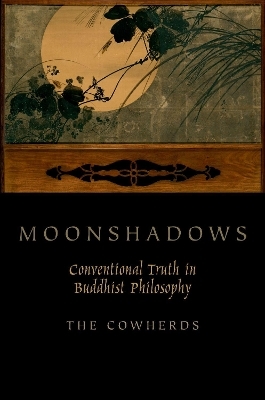
Moonshadows
Conventional Truth in Buddhist Philosophy
Seiten
2011
Oxford University Press Inc (Verlag)
978-0-19-975142-6 (ISBN)
Oxford University Press Inc (Verlag)
978-0-19-975142-6 (ISBN)
In Moonshadows, the Cowherds, a team of ten scholars of Buddhist Studies, address the nature of conventional truth as it is understood in the Madhyamaka tradition deriving from Nagarjuna and Candrakarti. Moonshadows combines textual scholarship with philosophical analysis to elucidate the metaphysical, epistemological and ethical consequences of this doctrine.
The doctrine of the two truths - a conventional truth and an ultimate truth - is central to Buddhist metaphysics and epistemology. The two truths (or two realities), the distinction between them, and the relation between them is understood variously in different Buddhist schools; it is of special importance to the Madhyamaka school. One theory is articulated with particular force by Nagarjuna (2nd C CE) who famously claims that the two truths are identical to one another and yet distinct. One of the most influential interpretations of Nagarjuna's difficult doctrine derives from the commentary of Candrakarti (6th C CE). In view of its special soteriological role, much attention has been devoted to explaining the nature of the ultimate truth; less, however, has been paid to understanding the nature of conventional truth, which is often described as "deceptive," "illusion," or "truth for fools." But because of the close relation between the two truths in Madhyamaka, conventional truth also demands analysis. Moonshadows, the product of years of collaboration by ten cowherds engaged in Philosophy and Buddhist Studies, provides this analysis. The book asks, "what is true about conventional truth?" and "what are the implications of an understanding of conventional truth for our lives?" Moonshadows begins with a philosophical exploration of classical Indian and Tibetan texts articulating Candrakati's view, and uses this textual exploration as a basis for a more systematic philosophical consideration of the issues raised by his account.
The doctrine of the two truths - a conventional truth and an ultimate truth - is central to Buddhist metaphysics and epistemology. The two truths (or two realities), the distinction between them, and the relation between them is understood variously in different Buddhist schools; it is of special importance to the Madhyamaka school. One theory is articulated with particular force by Nagarjuna (2nd C CE) who famously claims that the two truths are identical to one another and yet distinct. One of the most influential interpretations of Nagarjuna's difficult doctrine derives from the commentary of Candrakarti (6th C CE). In view of its special soteriological role, much attention has been devoted to explaining the nature of the ultimate truth; less, however, has been paid to understanding the nature of conventional truth, which is often described as "deceptive," "illusion," or "truth for fools." But because of the close relation between the two truths in Madhyamaka, conventional truth also demands analysis. Moonshadows, the product of years of collaboration by ten cowherds engaged in Philosophy and Buddhist Studies, provides this analysis. The book asks, "what is true about conventional truth?" and "what are the implications of an understanding of conventional truth for our lives?" Moonshadows begins with a philosophical exploration of classical Indian and Tibetan texts articulating Candrakati's view, and uses this textual exploration as a basis for a more systematic philosophical consideration of the issues raised by his account.
JG: Doris Silbert Professor in the Humanities and Professor of Philosophy, Smith College
ACKNOWLEDGMENTS; PREFACE; GUY NEWLAND AND TOM J F TILLEMANS; JAY L GARFIELD; SONAM THAKCHOE; GUY MARTIN NEWLAND; JAY L GARFIELD AND SONAM THAKCHOE; GEORGES DREYFUS; GEORGES DREYFUS AND JAY L GARFIELD; GRAHAM PRIEST, MARK SIDERITS AND TOM J F TILLEMANS; TOM J F TILLEMANS; MARK SIDERITS; BRONWYN FINNIGAN AND KOJI TANAKA; JAN WESTERHOFF; GRAHAM PRIEST; BRONWYN FINNIGAN AND KOJI TANAKA; REFERENCES AND ABBREVIATIONS; INDEX
| Erscheint lt. Verlag | 3.2.2011 |
|---|---|
| Verlagsort | New York |
| Sprache | englisch |
| Maße | 229 x 152 mm |
| Gewicht | 558 g |
| Themenwelt | Geisteswissenschaften ► Philosophie ► Östliche Philosophie |
| Geisteswissenschaften ► Religion / Theologie ► Buddhismus | |
| ISBN-10 | 0-19-975142-0 / 0199751420 |
| ISBN-13 | 978-0-19-975142-6 / 9780199751426 |
| Zustand | Neuware |
| Haben Sie eine Frage zum Produkt? |
Mehr entdecken
aus dem Bereich
aus dem Bereich


